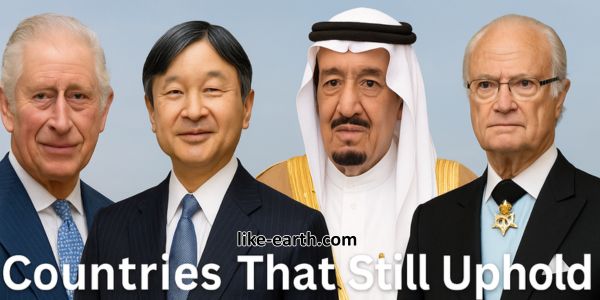Countries That Still Uphold Monarchy Today

Countries that still uphold monarchy today are often seen as paradoxes in a democratic era. Yet, these kingdoms remain pillars of tradition, heritage, and national identity for millions of citizens. In an increasingly modernized world, monarchies still exist in both symbolic and political capacities.
The Enduring Allure of Monarchy
Many people are captivated by royal families, elaborate ceremonies, and centuries-old palaces. Monarchies blend history with modern governance, offering a glimpse into the past while adapting to contemporary realities.
Constitutional vs Absolute Monarchies
There are two main types of monarchies today: constitutional and absolute. Constitutional monarchs, such as those in the UK, Japan, and Sweden, serve mainly ceremonial roles. Absolute monarchs, like those in Saudi Arabia or Brunei, hold real political power.
Notable Countries Still Retaining Monarchies
United Kingdom
The British monarchy remains one of the most recognized in the world. Despite political changes and public debates, the Royal Family continues to influence culture and tourism, playing a ceremonial role in governance.
Japan
Japan’s Chrysanthemum Throne is the oldest hereditary monarchy. The emperor symbolizes unity and continuity, though the government is fully democratic and parliamentary in structure.
Saudi Arabia
Unlike constitutional monarchies, Saudi Arabia is an absolute monarchy. The king exercises significant power over the government, judiciary, and military, intertwining religious leadership with state control.
Sweden
Sweden’s royal family, though ceremonial, plays a large role in national pride and diplomatic representation. They maintain high public approval and engage actively in charity and cultural events.
Thailand
The Thai monarchy holds deep spiritual and cultural value. While technically constitutional, the king wields considerable influence, both politically and socially, especially during times of national uncertainty.
Monaco
Monaco’s Prince Albert II oversees one of the world’s wealthiest and most glamorous microstates. The monarchy actively promotes tourism, luxury industries, and environmental causes.
Morocco
The Moroccan monarchy blends tradition and modernity. King Mohammed VI holds executive powers, though recent reforms aim for more democratic participation and development.
Why Monarchies Persist in Modern Times
- Stability: Monarchs often represent continuity in politically volatile regions.
- Cultural Identity: Royal families embody a nation’s history and values.
- Tourism: Monarchies are huge tourism draws, especially in Europe.
- Charity and Public Engagement: Modern royals actively engage in humanitarian causes.
Criticism and Controversies
Critics argue that monarchies are outdated, elitist, and expensive. In democratic societies, the idea of hereditary privilege can clash with the values of equality and meritocracy. However, reforms and modernization efforts continue to redefine their relevance.
The Financial Side of Monarchies
Maintaining royal households can cost taxpayers millions. Nonetheless, the debate often points to the revenue generated through tourism, merchandise, and international attention.
Monarchies and Media
Modern royals are media-savvy. Platforms like Instagram and YouTube are used by younger royals to connect with citizens, promote initiatives, and manage public image. Despite this, scandals or missteps can spark global headlines.
The Future of Global Monarchies
The role of monarchy is evolving. While some advocate for abolishment, others push for modernization rather than elimination. The coming decades will likely see further adaptation as monarchies strive to remain relevant.
Conclusion: Are Monarchies Here to Stay?
Countries that still uphold monarchy today are not simply clinging to the past—they are adapting it for modern audiences. Whether ceremonial or influential, these institutions remain deeply ingrained in their societies, culture, and identity.
As the debate continues, it is clear that monarchies, despite criticism, still command global fascination and domestic loyalty.
Explore more articles like this at our official website.
Join the discussion via our WhatsApp Channel.



